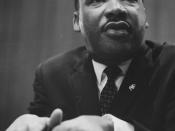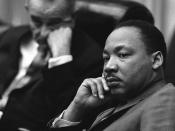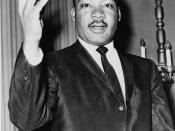Martin Luther King Jr. and Emma Goldman were both advocates of disobedience to governmental authority, but disobedience of different types, and for different reasons. In my essay I will explain these differences. I will also explain my opinions on both King's and Goldman's positions and why I agree or disagree with them.
Martin Luther King lead the civil rights movement in the late 50's to late 60's. In 1963 he went to Birmingham, Alabama in a nonviolent campaign against racial segregation. He was tired of watching the injustice there. He said "Injustice anywhere is a threat to justice everywhere." And "anyone who lives inside the United States can never be considered an outsider anywhere within its bounds."
The Negro leaders tried to negotiate with the Birmingham economic community, but promises were only broken. So the Negro community prepared for the last step in their nonviolent campaign, "direct action." The purpose was to create tension in the merchant community and force them to confront the issue of segregation.
King said, "Freedom is never voluntarily given by the oppressor; it must be demanded by the oppressed."
When King was asked: "How can you advocate breaking some laws and obeying others?" He said there were two kinds of laws, "just and unjust." He advocated obeying just laws because "a just law is a man-made code that squares with the moral law or the law of God." But believed we have a "moral responsibility to disobey unjust laws." An unjust law was a law that "degrades human personality." King believed that all segregation laws were unjust because "segregation distorts the soul and damages the personality. It gives the segregator a false sense of superiority and the segregated a false sense of inferiority." Thus he urged his people to obey the 1954 Supreme Court decision,


